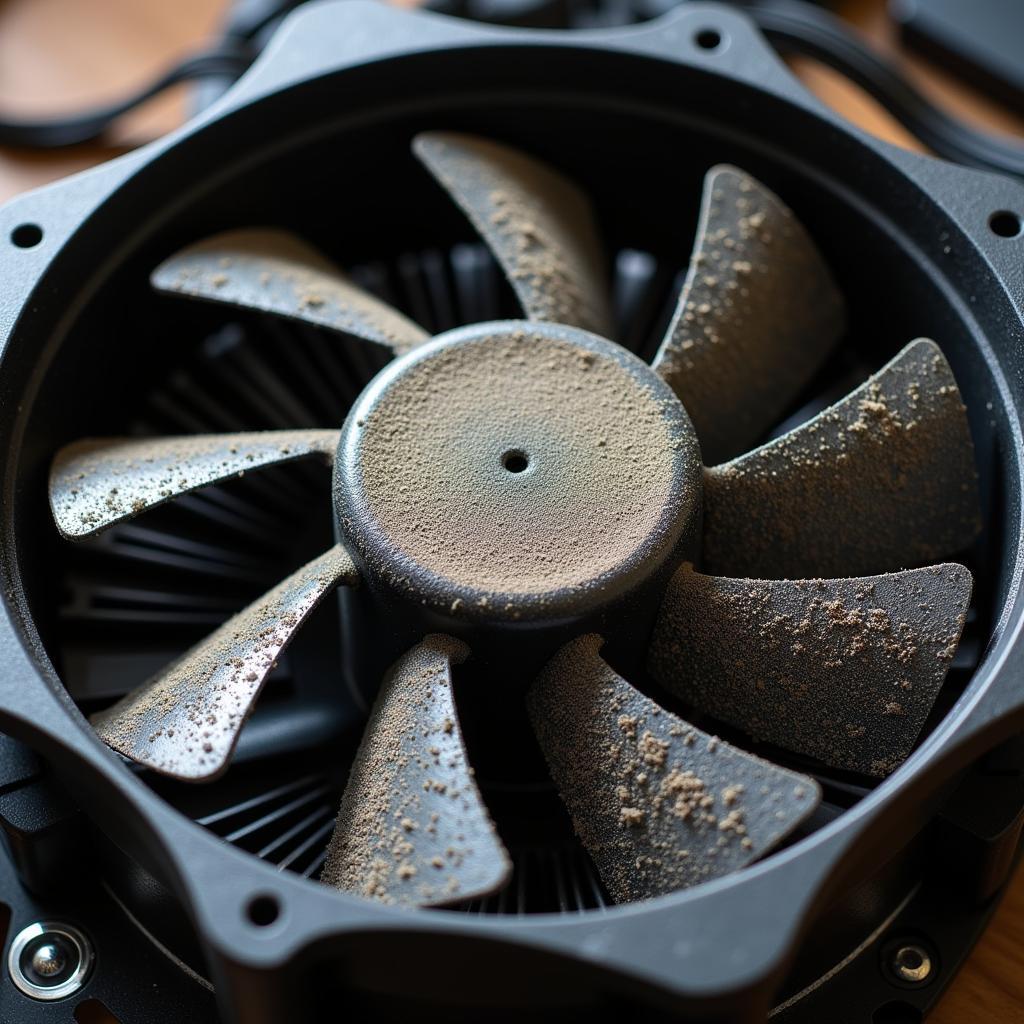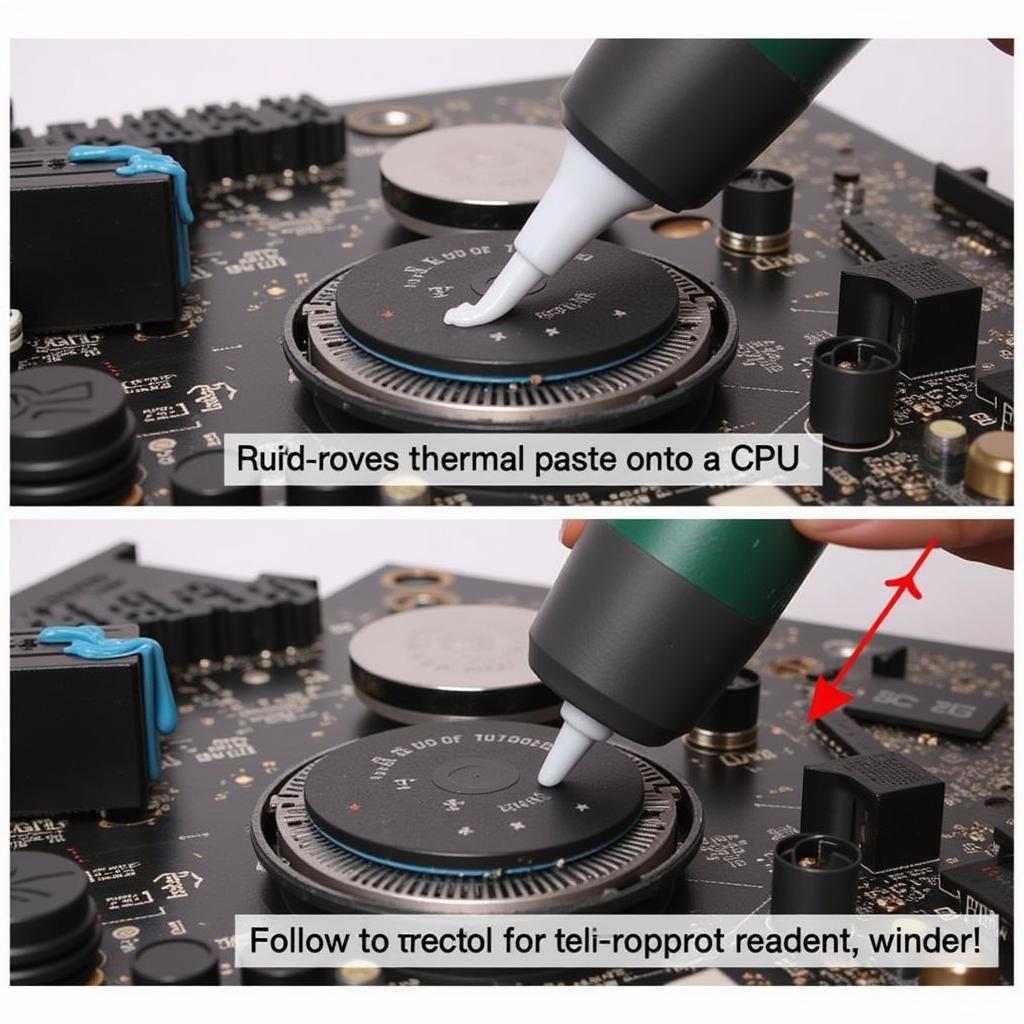The CPU fan is a critical component of any computer system, responsible for keeping the central processing unit (CPU) from overheating. Without a properly functioning CPU fan, your computer can experience performance issues, system crashes, and even permanent hardware damage. This comprehensive guide will delve into the essential aspects of the Cpu Fan Function, exploring its importance, common problems, and solutions.
The Vital Role of the CPU Fan
The CPU, often referred to as the “brain” of your computer, generates a significant amount of heat during operation. This heat, if not dissipated effectively, can lead to reduced performance, system instability, and potentially irreversible damage to the CPU itself. The CPU fan plays a vital role in preventing this by:
- Drawing cool air in: Most CPU fans are designed to pull cooler air from the surrounding environment into the computer case.
- Directing airflow over the heatsink: The fan directs this cooler air over a metal component called a heatsink, which is in direct contact with the CPU.
- Dissipating heat: As the cool air flows over the heatsink, it absorbs the heat generated by the CPU. The heated air is then expelled from the computer case, ensuring efficient cooling.
Common CPU Fan Issues and Troubleshooting
While CPU fans are generally reliable, several issues can arise, affecting their performance and potentially harming your computer. Here are some common problems and how to troubleshoot them:
1. CPU Fan Not Spinning
- Loose connection: Ensure the fan’s power connector is securely attached to the motherboard.
- Dust accumulation: Dust buildup can obstruct the fan blades, preventing rotation. Clean the fan and heatsink carefully using compressed air.
- Fan failure: Over time, fans can wear out and fail. If the fan doesn’t spin even after cleaning and checking connections, it might need replacement.
 CPU Fan Covered in Dust
CPU Fan Covered in Dust
2. Loud CPU Fan Noise
- Dust buildup: As mentioned earlier, dust can hinder fan rotation, leading to increased noise as the fan struggles to spin.
- Worn-out bearings: Over time, the bearings in the fan can wear out, causing grinding or whirring noises.
- Fan speed issues: If the fan is consistently running at high speed, it can be excessively loud. This could indicate overheating or a problem with the fan control settings in the BIOS.
3. CPU Overheating
- Insufficient cooling: Ensure the heatsink is properly seated on the CPU and that the thermal paste between them is applied correctly.
- Fan failure or malfunction: A malfunctioning or failed fan cannot provide adequate cooling.
- Demanding tasks: Running demanding applications or games for extended periods can push the CPU to its limits, generating excess heat.
 Applying Thermal Paste to CPU
Applying Thermal Paste to CPU
Optimizing CPU Fan Performance
To ensure optimal CPU cooling and prevent potential issues, consider these tips:
- Regular cleaning: Clean your computer regularly, including the CPU fan and heatsink, to prevent dust accumulation.
- Monitor CPU temperature: Utilize software tools to monitor your CPU temperature, especially during demanding tasks.
- Adjust fan speed: Some motherboards and BIOS settings allow manual fan speed control. However, proceed with caution, as improper settings can lead to inadequate cooling.
- Consider a CPU cooler upgrade: For enthusiasts or those with high-performance CPUs, upgrading to a more robust CPU cooler, such as a liquid cooler, can provide superior cooling capabilities.
Conclusion
The CPU fan function is crucial for maintaining the stability and longevity of your computer system. Understanding the importance of CPU cooling, recognizing common fan issues, and implementing proper maintenance practices will help you avoid costly repairs and ensure your computer operates at its best. If you’re experiencing persistent CPU fan problems, seeking assistance from a qualified computer technician is always recommended.
Frequently Asked Questions
1. How often should I clean my CPU fan?
It’s generally recommended to clean your CPU fan and heatsink every 3 to 6 months. However, if you live in a dusty environment or use your computer extensively, more frequent cleaning may be necessary.
2. Can I replace the CPU fan myself?
Yes, replacing a CPU fan is a relatively straightforward process for those comfortable with basic computer hardware. However, it’s essential to purchase a compatible fan and follow the manufacturer’s instructions carefully.
3. What is thermal paste, and why is it important?
Thermal paste is a thermally conductive material applied between the CPU and heatsink. It helps fill in microscopic imperfections on both surfaces, improving heat transfer and enhancing cooling efficiency.
4. What are the signs of a failing CPU fan?
Common signs of a failing CPU fan include loud noises (grinding, whirring), inconsistent fan speeds, and frequent system overheating.
5. Can a software issue cause CPU fan problems?
While less common, software issues, such as driver conflicts or incorrect BIOS settings, can sometimes affect CPU fan operation.
6. How do I know if my CPU cooler needs an upgrade?
If you’re experiencing frequent overheating, especially during demanding tasks, or if your current cooler is noisy and inefficient, it might be time to consider an upgrade.
7. What types of CPU coolers are available?
The two primary types of CPU coolers are air coolers (using a heatsink and fan) and liquid coolers (using a closed-loop system with a pump, radiator, and fans).
Need More Help?
Have other questions about “[cpu fan function]” or related topics like “cpu fan not functioning” or “fan tản nhiệt cpu laptop dell inspiron 14z 5423“? Check out our other informative articles on FansBongDa.com.
For personalized assistance, contact our 24/7 customer support team:
Phone: 0903426737
Email: fansbongda@gmail.com
Address: Tổ 9, Khu 6, Phường Giếng Đáy, Thành Phố Hạ Long, Giếng Đáy, Hạ Long, Quảng Ninh, Việt Nam.
We’re here to help you keep your computer running cool and performing at its best!


